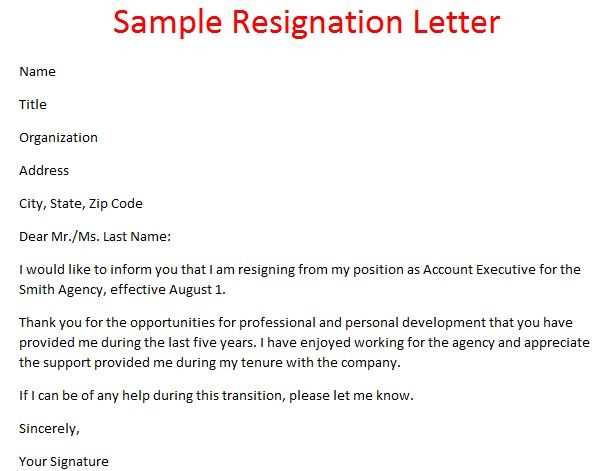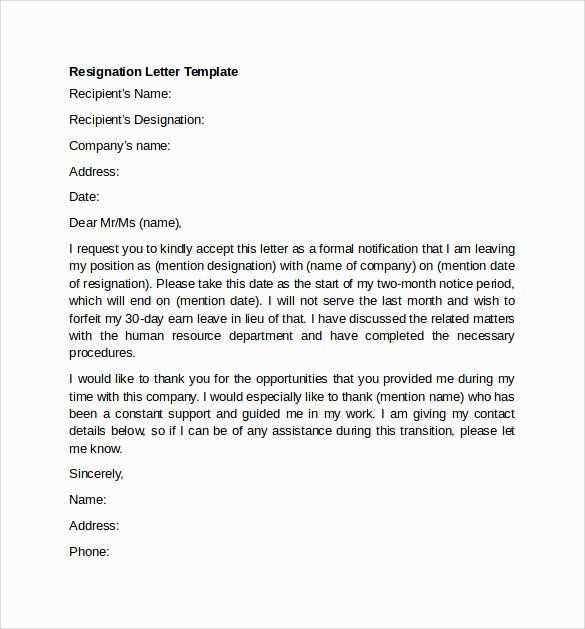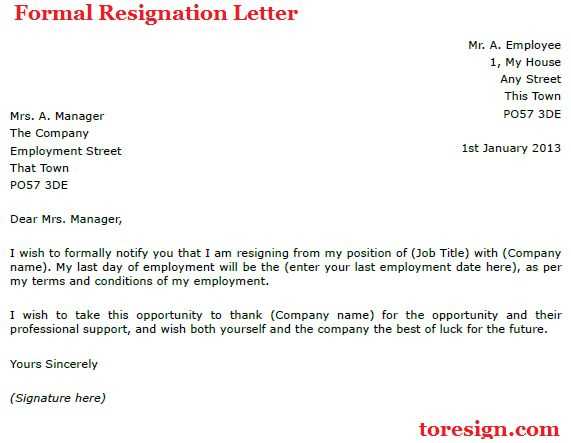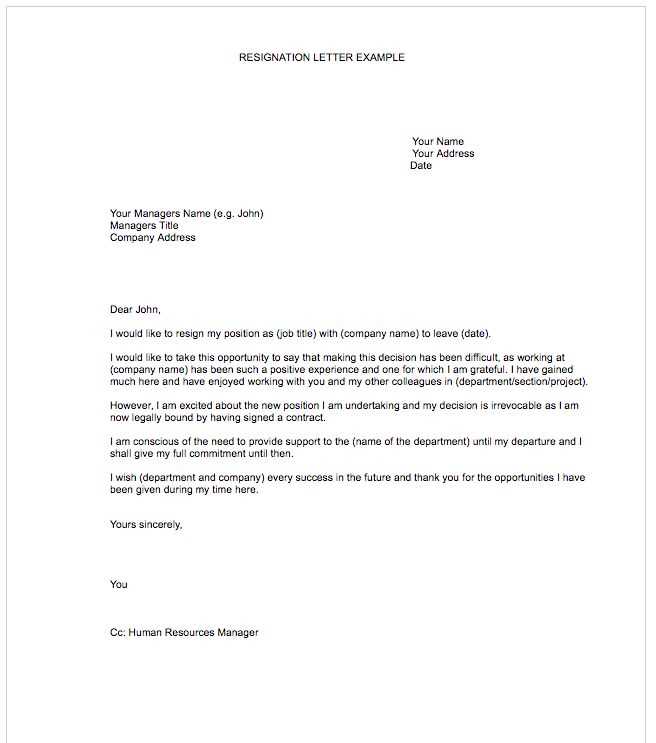Resign Letter Template for a Smooth Career Transition

Leaving a job is a significant event in any career, and conveying your decision in a clear, respectful manner is essential. A formal notice is a way to express your intent to move on while maintaining professionalism. The right approach ensures you leave on good terms, preserving relationships and your reputation.
Whether you’re moving to a new opportunity or pursuing personal goals, it’s important to communicate your departure thoughtfully. This document should reflect your appreciation for the experience, offer your help during the transition, and express gratitude for the time spent with the company.
Effective communication during this time can help smooth the exit process, leaving a lasting positive impression. By understanding the structure and tone of such a message, you can navigate this transition gracefully.
Essential Components of a Resign Letter

When crafting a formal notice of departure, certain elements must be included to ensure clarity and professionalism. These key components not only communicate your decision effectively but also help maintain positive relationships with your employer.
The first aspect to include is a clear statement of your intent to leave. This provides transparency and sets the tone for the rest of the message. Follow this with the specific date of your final working day, which gives your employer enough time to make necessary arrangements.
In addition, expressing gratitude for the opportunity and experiences gained during your time at the company is crucial. A positive closing ensures you leave on good terms. Finally, offering assistance during the transition shows your commitment to helping the team even after your departure.
How to Write a Professional Goodbye
When it’s time to part ways with your current role, it’s important to leave on a positive note. Writing a respectful and professional message is the key to ensuring that you exit gracefully while maintaining valuable connections. A well-crafted farewell should express your gratitude, acknowledge the time spent at the company, and offer a sense of closure.
Structure of a Polite Farewell
The tone and structure of your message are critical to conveying professionalism. The following elements should be present in a proper farewell message:
| Component | Purpose |
|---|---|
| Gratitude | Thank your employer for the opportunity to work with the company. |
| Notice of Departure | Clearly state the date of your departure to ensure a smooth transition. |
| Offer of Assistance | Express your willingness to help with the handover or transition process. |
| Positive Closing | End with well wishes and hope for continued success for both you and the company. |
Maintain a Respectful Tone
Always keep a respectful tone, regardless of the circumstances surrounding your decision. It’s important to part on good terms and leave behind a professional image. A well-worded farewell helps maintain your reputation and could prove beneficial in future career opportunities.
Understanding the Right Tone for Resignation
Choosing the correct tone is essential when conveying your decision to leave. The way you express yourself influences how your message is received and can have lasting effects on your professional relationships. A well-balanced tone can help ensure that your departure is understood as respectful and amicable, regardless of the reasons for your decision.
Here are key aspects to keep in mind when establishing the right tone:
- Professionalism: Your message should maintain a formal and respectful tone, acknowledging the experience and opportunity provided by your employer.
- Gratitude: Express appreciation for the skills and relationships developed during your time at the company, highlighting positive experiences.
- Clarity: Be clear and concise about your decision and your final working day to avoid any misunderstandings.
- Neutrality: If your decision stems from negative circumstances, avoid venting or blaming. Instead, remain neutral to ensure your departure is seen as a personal choice.
By balancing these factors, you can maintain a positive and professional demeanor while sharing your decision to move on. A respectful tone encourages understanding and leaves a lasting, positive impression.
Common Mistakes to Avoid in Your Letter
When composing a formal notice to leave your current position, it’s essential to avoid common errors that could tarnish your professional image. The way you express your decision can have lasting effects on your reputation and relationships within the workplace. By steering clear of these frequent pitfalls, you can ensure that your communication remains clear, respectful, and constructive.
Here are some of the most common mistakes to avoid:
- Being Too Abrupt: Jumping straight into the departure without offering context or a thoughtful explanation can come across as impolite. It’s important to express appreciation for the opportunity.
- Over-Explaining: While it’s good to provide reasoning for your departure, too many details or personal information can make the message feel overly informal or inappropriate for the situation.
- Leaving Without Gratitude: Failing to acknowledge the positive aspects of your time at the company may leave the wrong impression. Always express your thanks for the opportunity and experiences gained.
- Being Negative: Negative comments or criticisms about the company, colleagues, or management should be avoided. This can reflect poorly on you and leave a bad impression.
- Not Providing Sufficient Notice: Failing to specify your last day or not giving enough time for a smooth transition can cause unnecessary disruption and inconvenience for your employer.
By avoiding these mistakes, you can ensure that your communication is clear, respectful, and leaves a positive final impression.
Customizing Your Resign Letter for Different Roles

Every position you hold within an organization has a different dynamic, and your communication about leaving should reflect the nature of your role and the relationships you’ve built. Tailoring your departure message to fit the specific responsibilities and context of your job ensures that your message is appropriate, respectful, and aligned with your experience in the company.
Adjusting Tone Based on Seniority

If you’re in a senior position, your message should be more formal and comprehensive, acknowledging the leadership and opportunities provided by the company. On the other hand, for junior or entry-level roles, a shorter and simpler note expressing gratitude for the learning experience may be more appropriate.
Industry-Specific Considerations
In industries where relationships are central, such as client-facing roles or sales, it’s important to emphasize gratitude for teamwork and express your commitment to ensuring a smooth transition. In technical or operational roles, the focus may be more on offering assistance during the handover of projects or responsibilities.
By adjusting your message to suit the specific role you are leaving, you can ensure that your departure is communicated appropriately while maintaining professionalism and goodwill.